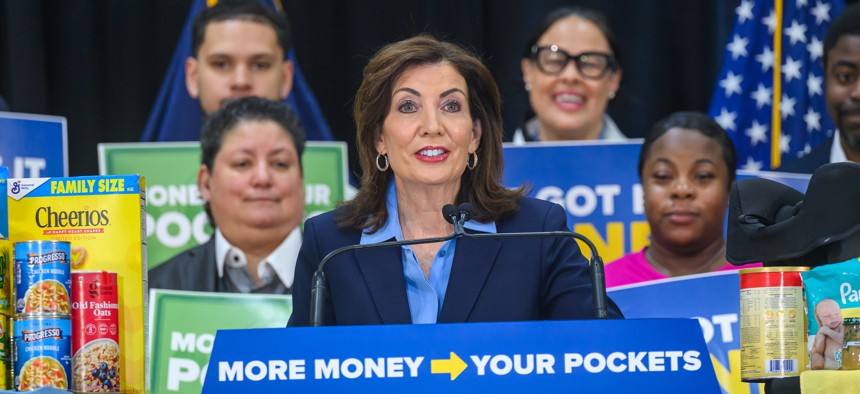Budget
Will the state budget deliver on Hochul’s affordability promises?
Many of the governor’s marquee affordability proposals look likely to make it into the final version of the budget, which could help Hochul as she runs for reelection.

Gov. Kathy Hochul touts her affordability wins in the forthcoming state budget on April 30, 2025. Susan Watts/Office of Governor Kathy Hochul
Gov. Kathy Hochul and state Democrats identified affordability as the year’s marquee issue, and the state budget seems on pace to address that, even if it is in a much more watered-down format than Hochul had hoped.
The governor has succeeded in pushing through inflation rebate checks, bumped up funding for child care vouchers, funded universal free school lunches, cut middle-class taxes and even changed her mind about the Housing Access Voucher Program. But there have been some hiccups. Her checks were pared down in size, the federal government might undercut her plan for school lunches, the housing vouchers are turning into a bargaining chip and New York City is perturbed at how she went about addressing the child care cliff.
The latest Siena Poll, which shows Hochul with her highest approval rating in some time, also found that 65% of New Yorkers had a negative opinion of the state economy. Democrats had assumed the Trump administration would introduce economic policies that would worsen the economy, but the casual talk of an impending recession still caught many off-guard. Hochul’s plans to introduce middle-class tax cuts and expand the child tax credit could lessen the blow, but the financial outlook for the state, and the country for that matter, is gloomy.
Patrick Orecki, director of state studies at the fiscally conservative Citizens Budget Commission, views Hochul’s affordability push in this year's state budget as well-intentioned but ultimately inefficient. The tax relief could make a real impact, he said, but otherwise the benefits are spread too thin.
“When we talk wasteful, thinking specifically of the inflation refund checks to send out as much as $3 billion, as proposed by the governor, in such small increments to nearly every taxpayer, it's just not going to have the benefits that are really going to change households’ finances for many of the people who receive it,” Orecki told City & State.
Similarly, he said, the Housing Access Voucher Program pilot would need to be drastically expanded to function properly, which would likely lead to inflated costs.
The political ramifications of the state budget are significant as Hochul will likely face political opponents from both the right and the left ahead of a reelection campaign next year. If she can show that she has taken concrete action to address affordability concerns, while her likely opponents were either powerless to affect the economy or were even part of the Republican majority in Congress that backed federal budget cuts, that could be a boon for her. However, any success in the budget could be undone by the tough choices the state will need to make later this year to address a possible reduction in federal funding.
Even if she can score some points with her budget, she still faces the problem of actually communicating that to voters who don’t track state policy developments all that closely. Political consultant Morgan Hook said that for all that Democrats may achieve, they need to get better at talking about it in public.
“As we saw last year in the presidential election, it can be less about what you achieved and more about how people feel about what you achieved,” Hook said.
If Hochul can successfully explain what she’s done for New Yorkers, even before there is an actual state budget to speak of, that could make the difference over the coming months as her campaign ramps up, he said.
“What they’ll be paying attention to is what they see on the news and what they see if the governor comes to town and holds a rally or holds a press conference,” Hook said. “What’s going to be the soundbite they hear and are they going to see that in their day to day lives?”

